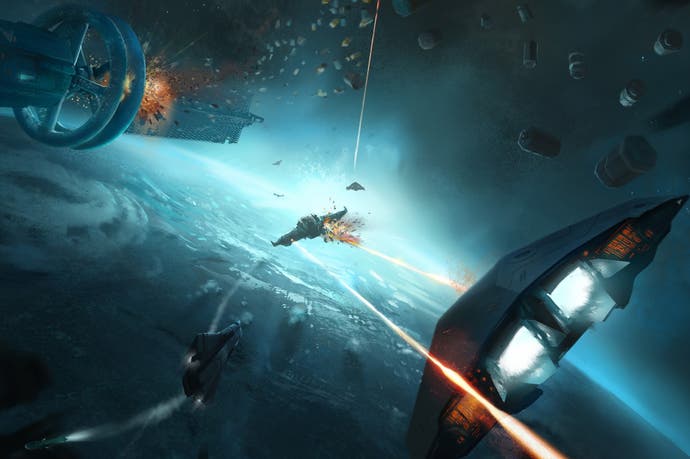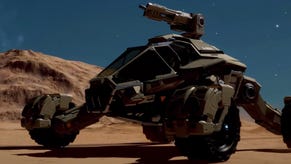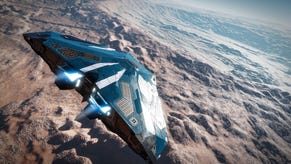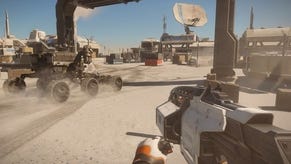The resurrection of Elite: Braben talks Dangerous
"If this were on console, there would be an expectation it would be dumbed down.¡±
It started with an acorn. An Acorn Atom, to be precise, unwrapped by the young David Braben on Christmas morning, 1981. This simple, inexpensive computer with its 1MHz CPU and 2KB of RAM was enough to plant a seed in his imagination that would, with the help of Ian Bell, soon stretch right out to the stars. Some two years after receiving his first computer, his idea would lead Braben to the offices of a London publisher to show the demo for his 3D space epic, Elite.
"I was very young and naïve. I'd been talking to Thorn EMI, and I thought it's a big shiny publisher, publishing on all the platforms with swanky offices in London, so it must be a good publisher. Ian and I took Elite, which was fully playable, and we showed it to them. They were like wow, this is a really amazing tech demo, and the programming people were wetting themselves."
The excitement was short-lived. Soon after the meeting, Braben and Bell received a note from Thorn EMI. "It wasn't quite a rejection letter - it was saying these are the things that we want you to change. To me it was listing all the things that I thought were great about it. They were saying why would anyone want to supply their own disk and cassette to save the game onto? They wanted a score, and people's expectation of a game back then is that it takes five minutes to play it, ten minutes if you're really good."
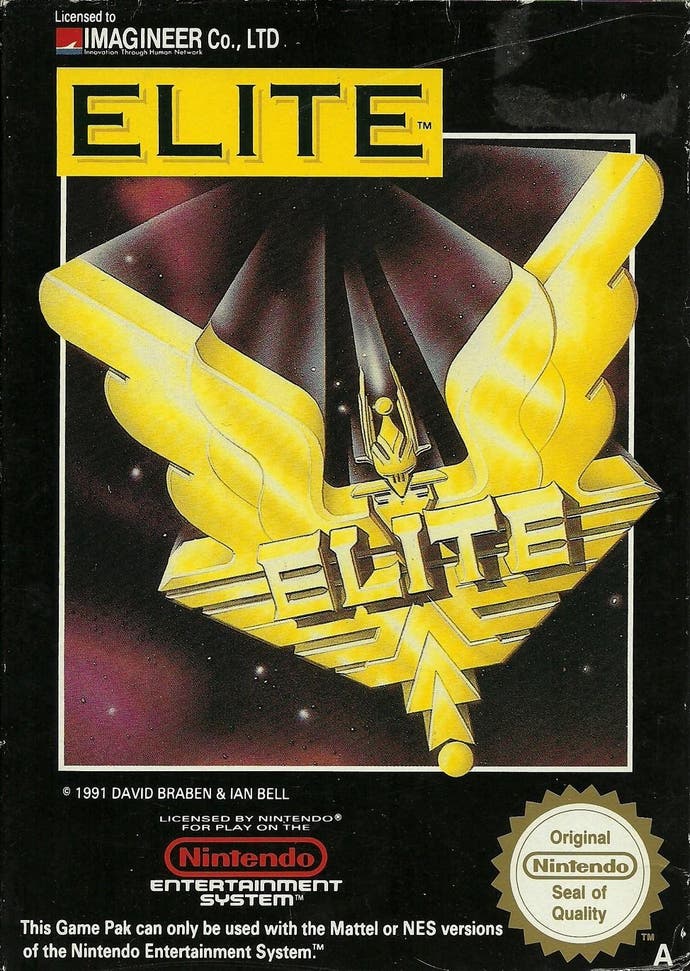
For Thorn EMI, it was all it knew. Its big success of the previous year, River Rescue, was a breathtakingly simple concept in which players simply navigated a scrolling course whilst avoiding crocodiles and canoes. Every so often a stranded explorer would come into view for you to rescue; collect three and you got to start all over again.
The simplicity was born from the arcades, the success of which was all publishers wanted to emulate. "That was the main aspirational place. The shiny games that were coming out were things like Williams' Defender, and Pac-Man was still very big in the arcade. Battlezone, too. They were all games that had three lives - you got an extra life at 10,000 points, and Battlezone was the rebellious one because it was a slightly higher number, but essentially it was the same. They were very, very regimented, and they were based around the coin drop. The whole point of the design of arcade machines is you want most players, ideally, to only last between 30 seconds and a minute, and a few experts to last five or ten minutes but no more than that."
An open-world, open-ended game whose playtime could be measured in weeks, not minutes? As an idea it was unprecedented, and it took the more open-minded staff at publisher Acornsoft to help see it through to completion. "The response couldn't have been any more different. Acorn was run by people like us," says Braben. "True, real gamers who went, 'Wow, this is amazing - how did you do that, let's have a go!' The very fact that the first thing they said was let's try it shows that they wanted to play it. Whereas Thorn EMI, I don't think they even took the controls - not the people that were making the decisions, anyway. It's that sort of difference."
Elite, as history records, went on to do rather well after its release in 1984. Thanks to the fuzziness of the 80s games market, it's hard to say exactly how well - some 600,000 copies of the original are estimated to have been shifted - but its impact amounted to nothing short of a phenomenon. "What happened, when Elite came out and did eye-wateringly well at the time, it changed publisher's mindsets. Where what happened then, suddenly a plethora of new types of game came out."
There were imitators, there were successors and there was the foundation of an open-world genre that continues with no small amount of success today. Some of Elite's stardust can still be seen twinkling in the likes of Eve Online, Grand Theft Auto and The Elder Scrolls, all of which build in their own ways on the template laid down by Braben and Bell.
And then there were sequels, courtesy of publishers GameTek and Konami with 1993's Frontier and 1995's First Encounter. Yet despite the success, and despite the legacy, a fourth game has taken its time to emerge. Elite 4's existed, in one way or another, since 2000, yet Braben spent the following 12 years seeing off questions about its whereabouts as the project hung in stasis. Was it a case of history repeating itself, and of publishers having cold feet?
"There was publisher interest - but the problem is, they're after a schedule and a release and for you to say what's going to be in it. It would constrain what's in the game, and there would be an expectation that we would be on console, and there would then be a follow-on expectation that the game design would be dumbed-down."
Prior experience, too, dissuaded Braben from exploring the traditional publisher route. "I think my experience with Konami and then Gametek with Elite 2 was such that I didn't especially want to revisit that. I knew the way it would go - they said they wouldn't interfere and all this sort of thing, but they did. And it was an absolute nightmare. The problem is, if you're making a game where it's very clear how you make it and what you're making, then doing it with a publisher's fine. If you need to finesse key elements to get it to feel just right - which might involve significant changes to the game design - that's where you have a real problem with a publisher who wants to know what will be delivered at what point. There isn't the scope for that to change."
"I think my experience with Konami and then Gametek with Elite 2 was such that I didn't especially want to revisit that. They said they wouldn't interfere, but they did."
The platform on which that would be possible arrived a couple of years back. Elite: Dangerous hit Kickstarter in November 2012, shooting for £1.25 million of funding which it met days before the deadline was up. For fans of the series who have been pestering Braben and his studio Frontier for a new instalment it's a dream come true, and for Braben himself it's a chance at last to see to completion a project that's stretched out for well over a decade. "You know conceptually - and I think I've made this very clear - this is a game that I've wanted to make for a long time. Some of the ideas behind that have things in common, inevitably, with what we're doing now, but it is still quite different."
Elite: Dangerous is working towards being everything players have asked of a contemporary spin on the 1984 original, and in light of all that's gone on in the open-world genre since the series' last entry - when First Encounter came out in 1995, GTA was still a couple of years away from conception, while The Elder Scrolls was just beginning to find its feet in its own open world - it's working towards meeting modern expectations of the open-world genre.
Dangerous casts you as the solo pilot lost in the black, rich void of space, then, and asks you to thread your way through its vast open world any way you choose. It's learnt from the likes of Skyrim and Grand Theft Auto 5, sure - "there's nothing worse than having acres and acres of sameness," says Braben, "and that's often the risk of these open-world games" - but more importantly it's stayed true to the same nerdish spirit that made the original Elite an enduring classic.
"It's about making the world as believable as possible, and that wherever you go there's always something interesting to a player," says Braben, who's insisted on injecting Elite: Dangerous' world with as much scientific authenticity as possible. "I personally think it makes the world so much richer and more plausible to think that this is actually a possibility - that it could actually be like this. Gravity is one of the things we've focused on, and is a poster child for our philosophy - and everything from that to, you know, once you can 3D print things, will you 3D print burgers? How does the world change when technology that we see now in its infancy comes to fruition?"
Already there are small hints of that grander world running through the Elite: Dangerous alpha, a small selection of combat scenarios threaded with a thin narrative through-line. It's a dazzling slice of what's to come, complete with breathtaking production values that flourish the world of Elite with sumptuous detail. Cockpits crack under enemy fire, the oxygen rushing out leaving the stony silence of space, while ships display contextual damage, tearing apart believably as you unleash your arsenal. What's best, though, is that even in this tiniest slither of Dangerous, Frontier sells you on the impossible vastness of space, and the countless possibilities Elite's always enabled within it.
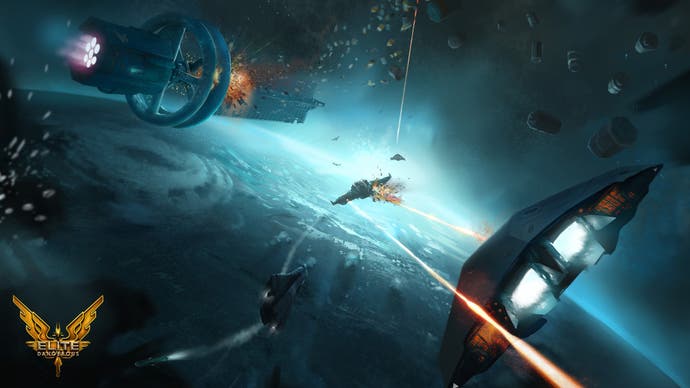
So it's still Elite, allowing you to plot your own journey through the ranks from 'Harmless' upwards, and it's bringing with it a wider, connected world that allows you to share your experiences with others. "What we try to do, and what I think works best in games, is where there's player co-operation," explains Braben. "That's the richest thing. One of the things you'll see in the alpha is the majority of ships you encounter are not human - they're run by the game. And that's because we want the experience of being a pirate to not be about killing players, because for the person being killed that's not necessarily a good experience.
"We've structured the rules - we have this thing called the Pilot's Federation, where all player characters are members. That's how, from a game point of view, how we distinguish between what are AI pilots and human pilots. And they respond much more aggressively by putting bounties on your head if you kill their own members. So a player killer will attract a bounty very, very quickly. And then becomes fair game to other players - because once you've got a bounty it's okay to kill another player. That should be self-balancing. Obviously we'll tune the levels, and we will get player/player kills, but we're hoping it'll be a much more rare event."
Already there have been instances of vigilantism in the alpha, with players rushing in to take down and punish any would-be pirate who's shot down another player-controlled craft, and already within the rule-set there's the potential for countless new stories to be told. It's all part of a new, slightly bolder Elite that - quite importantly - doesn't feel at all out of place in the modern day.
Braben himself seems energised in conversation, carrying that same spark that took him through the development of the Acorn original 30 years ago, a spark that's lost none of its ferocity. "We're writing this game for ourselves, fundamentally," he enthuses. "And that's what we did with the original Elite. It's not for an imagined market. And when I say ourselves, it's also the wider audience - all the people who backed us, and are on forums.
"We're all together on this. It's not like we're writing for an imagined audience. We're writing for people we know. People we might go to the pub with, who say that's crap, that doesn't work, or I want this. Or they say I want to just be able to head out into space and explore. So we say right - let's go and make that possible."
